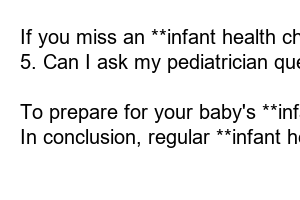영유아 건강검진
Infant Health Check-up: Everything You Need to Know
As a parent, ensuring your baby’s health is always a top priority. One crucial aspect of taking care of your little one is regular **infant health check-ups**. These check-ups are essential for monitoring your baby’s growth and development and catching any potential health issues early on. Here’s everything you need to know about infant health check-ups:
Importance of Infant Health Check-ups
Regular **infant health check-ups** are crucial for ensuring your baby’s well-being and getting timely medical attention if needed. During these check-ups, your pediatrician will assess your baby’s growth, development, and overall health to ensure they are hitting important milestones.
What to Expect During an Infant Health Check-up
During an **infant health check-up**, your pediatrician will measure your baby’s weight, length, and head circumference to track their growth. They will also check for any **developmental** delays and assess your baby’s feeding habits and sleeping patterns.
Common Tests and Screenings
In addition to the physical examination, your baby might also undergo certain tests and screenings during their **infant health check-up**. These can include blood tests, hearing tests, vision tests, and **vaccinations** to protect them from serious diseases.
Tips for a Successful Infant Health Check-up
To ensure a successful **infant health check-up**, make sure to schedule it in advance and arrive on time. Bring any **medical** records or concerns you have, and be prepared to ask questions about your baby’s health and development.
Frequently Asked Questions
1. When should I schedule my baby’s first **infant health check-up**?
It is recommended to schedule your baby’s first **infant health check-up** within the first week of birth.
2. How often should I take my baby for **infant health check-ups**?
Your baby should have regular **infant health check-ups** at 1 month, 2 months, 4 months, 6 months, 9 months, and 12 months of age.
3. What should I bring to my baby’s **infant health check-up**?
Bring any **medical** records, feeding logs, and a list of questions or concerns you have about your baby’s health.
4. What if I miss my baby’s **infant health check-up** appointment?
If you miss an **infant health check-up** appointment, reschedule it as soon as possible to ensure your baby’s health is being monitored.
5. Can I ask my pediatrician questions during my baby’s **infant health check-up**?
Absolutely! Your pediatrician is there to address any questions or concerns you have about your baby’s health and development.
6. How can I prepare for my baby’s **infant health check-up**?
To prepare for your baby’s **infant health check-up**, make a list of questions or concerns, gather any **medical** records, and ensure your baby is well-fed and rested before the appointment.
In conclusion, regular **infant health check-ups** are essential for monitoring your baby’s growth and development and ensuring they are healthy and thriving. By staying on top of these check-ups and working closely with your pediatrician, you can give your baby the best start in life.

